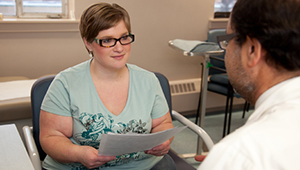David E. Arterburn, MD, MPH
Biography
David Arterburn, MD, MPH, is a general internist and health services researcher who focuses on finding safe, effective, and non-stigmatizing ways to treat obesity. As an international leader in obesity research, his goal is to help individuals and families make treatment decisions that align with their values while sustaining their health over the long haul.
Dr. Arterburn's research portfolio includes studies of the impact of neighborhood environments on obesity, mindfulness-based interventions for weight loss, obesity pharmacotherapy, the long-term outcomes of bariatric surgery, and implementation of shared decision making tools and processes. He recently led the PCORnet Bariatric Study, a two-year, $4.5 million study comparing the health benefits and safety associated with the main types of bariatric surgery in 41 health systems in the United States. Funded by the Patient-Centered Outcomes Research Institute (PCORI), the study’s results give patients and their health care providers the information they need to decide which type of surgery is best for them. In July 2019, PCORI awarded Dr. Arterburn an additional $2.1 million to incorporate these new results into shared decision making at Kaiser Permanente Washington and the University of Pittsburgh Medical Center.
Over the past decade, Dr. Arterburn has collaborated with Kaiser Permanente Washington's specialty leadership to implement and evaluate shared decision making with patient decision aids to support elective surgical care. The approach has shown great promise for improving the quality of health care while simultaneously lowering the costs of care in some populations.
Dr. Arterburn collaborates extensively in his research and has federally-funded projects related to obesity and bariatric surgery with investigators at University of Washington (UW), Duke University, Harvard, University of Pittsburgh, University of Michigan, Wake Forest, and the Cleveland Clinic.
Dr. Arterburn joined Kaiser Permanente Washington Health Research Institute in 2006. In recognition of his contributions to science, he has been named an honorary Fellow of the American Society of Metabolic and Bariatric Surgery (FASMBS) and a Fellow of the American College of Physicians (FACP) and The Obesity Society (FTOS). Dr. Arterburn is past chair of the Adult Obesity Measurement Advisory Panel sponsored by the National Committee on Quality Assurance, founding chair of the Obesity Society's Health Services Research Section, and past chair of the Health Care Systems Research Network's Obesity Special Interest Group. In 2013 he co-chaired the National Institutes of Health Symposium on the Long-Term Outcomes of Bariatric Surgery. He is also an affiliate professor in the UW Department of Medicine.
RESEARCH INTERESTS AND EXPERIENCE
-
Obesity
Bariatric surgery; health services research; economics and risk adjustment; pharmaceutical outcomes research
-
Health Services & Economics
Obesity prevention and control
-
Medication Use & Patient Safety
Pharmaco-epidemiology, pharmacogenetics, pharmaceutical outcomes research
-
Patient/Provider Interaction
Shared decision making
-
Behavior Change
Obesity prevention and control
Recent publications
Arterburn DE, Bogart A, Sherwood NE, Sidney S, Coleman KJ, Haneuse S, O'Connor PJ, Theis MK, Campos GM, McCulloch D, Selby J. A multisite study of long-term remission and relapse of type 2 diabetes mellitus following gastric bypass. Obes Surg. 2013 Jan;23(1):93-102. doi: 10.1007/s11695-012-0802-1. Epub 2012 Nov 18. PubMed
Hsu C, Liss DT, Westbrook EO, Arterburn D. Incorporating patient decision aids into standard clinical practice in an integrated delivery system. Med Decis Making. 2013 Jan;33(1):85-97. doi: 10.1177/0272989X12468615. PubMed
Arterburn DE, O'Connor PJ. A look ahead at the future of diabetes prevention and treatment. JAMA. 2012;308(23):2517-2518. doi:10.1001/jama.2012.144749. PubMed
Wong ES, Wang BC, Alfonso RC, Flum DR, Sullivan SD, Garrison LP, Arterburn DE. Body mass index trajectories among the severely obese: results from an electronic medical record population. Obesity (Silver Spring). 2012 Oct;20(10):2107-12. doi: 10.1038/oby.2012.29. Epub 2012 Feb 8. PubMed
Arterburn D, Wellman R, Westbrook E, Rutter C, Ross T, McCulloch D, Handley M, Jung C. Introducing decision aids at Group Health was linked to sharply lower hip and knee surgery rates and costs. Health Aff (Millwood). 2012;31(9):2094-104. PubMed
News

Seattle's Sweetened Beverage Tax linked to improved public health outcomes
An evaluation with KPWHRI researchers looked at the impacts of the tax so far.
Live healthy

Comparing different types of bariatric surgery: What’s right for you?
Based on their studies, KPWHRI researchers explain the risks and benefits.
M2H study

Can where you move impact future weight gain?
A new study finds that moving from low- to high-density neighborhoods might be related to reductions in weight gain.
Live healthy

What is shared decision-making?
An explanation from KPWHRI researchers about discussing treatment options with a medical provider.



